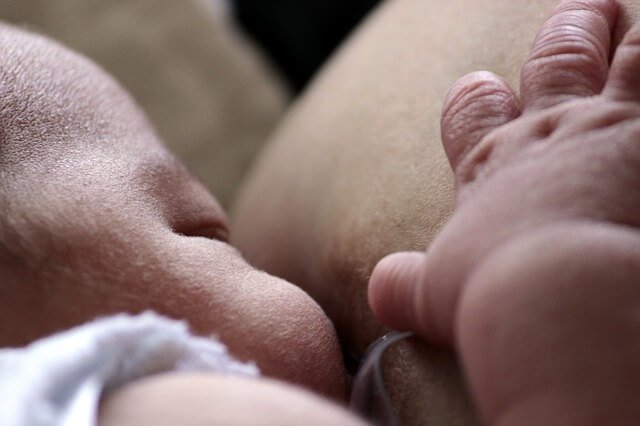Breastfeeding is an activity that is needed for a baby’s growth and development. Nursing mothers need to take absolute care with this as it is crucial and will aid the upbringing of a child. However, breastfeeding also has its challenges, and one of them is no colostrum. Colostrum is the first milk produced by the breast after birth, but when this milk isn’t produced, mothers get worried and feel as if there’s something they aren’t doing.
Hey! By the way… any links on this page that lead to products on Amazon are affiliate links and I earn a commission if you make a purchase. Thanks in advance – I really appreciate it! .
At the same time, colostrum has high concentrations of nutrients and antibodies, that is needed by the baby and the inability to get it might lead to a series of conditions in a baby. There are various hormones in charge of milk production, and they include prolactin, cortisol, insulin and thyroid hormones. These are the hormones that do help in milk production and stimulation.
Consequently, many factors can cause no colostrum in mothers. These factors are not a cause for concern as milk will eventually come out, but you must know it so that you can avoid them if you can.
Causes of no colostrum in mothers
1) Premature Babies
If you gave birth to a preemie, there’s a tendency for your milk to be delayed. Do you know why? Breast milk can be produced when your baby stimulates it. Since a preemie will be taken away from the mother immediately after birth for adequate medical attention, breast milk production might take a while.
2) Cesarean delivery
Assuming you had to undergo Cesarean Surgery before delivering your baby, the operation can cause a delay in milk production.
3) Stressful delivery
Undergone a stressful and tiring delivery? Took too long to push? Or in the labour room for a long time? All these can cause your breast milk to take a while. Just be patient with yourself.
4) Pain relief medication
It is known that pain relievers are given during the process of delivery. There are some of these pain relief medication that can delay your milk production.
5) Diabetes
If you’ve got a medical condition like diabetes before giving birth, the condition might hinder milk production after birth. You need to ask your breastfeeding consultant on steps to take.
6) Intravenous Fluid
A large number of intravenous fluids during delivery can delay your milk production.
7) Thyroid problem
The thyroid gland produces thyroxine which is needed for growth and normal functioning of the body. Also, the gland is associated with breastfeeding, and if it is not active or if it is overactive, it can hinder breast milk production.
8) Too much bleeding when giving birth can also cause no colostrum.
9) Obesity and being overweight can also be a cause of no colostrum in mothers.
10) Medications can also interfere with your breast milk production. Medications like your birth control pills should be recommended, and you should make sure they won’t interfere with your milk stimulation.
The above are factors that can hinder breast milk production in mothers. However, before you seek medical attention for some of the factors, you can actually stimulate milk production yourself. As it is said that your baby can stimulate breast milk production, it can also be produced by other factors. So, let’s see the solution to the no colostrum issue faced by mothers.
Solutions For No Colostrum after delivery
1) Use the breast pump or your hand to stimulate your breast to produce milk after delivery.
2) Before expressing your breast milk, take a warm shower. A warm shower will help to boost the hormone responsible for milk production, and you’ll be able to get enough milk.
3) Are you facing the no colostrum challenge after birth? Drink lots of water. Studies have shown that milk production will be stimulated by adequate water intake.
4) Use the hospital grade pump. The grade pump has extra suction that will allow your milk to be produced rapidly.
5) A full breast will not produce milk, but an empty one will. So, therefore, make sure you empty your breast milk frequently. You should pump like 2-3 hours in a day for more milk production.
6) Listen to relaxing music can also stimulate your milk production.
7) Position your baby well and let him or her have a good latch on the breast. A good latch doesn’t consist of the nipple alone but also some of the breast tissue. Doing this will help your baby feed well and increase your milk production.
8) Research has shown that prolactin, which is the hormone in charge of milk production is ways high in the night. So, this means that milk production will be higher during the night, you should take advantage of this and make it a habit to feed your baby well during the night.
9) Get adequate sleep so that your milk production will increase.
10) Feed your baby when he or she is sleepy as it will stimulate milk production.
These are the solutions to the no colostrum issue after delivery. So, if you encounter the no colostrum challenge, before seeking medical attention (if you’re sure it isn’t needed), then you can try any of the solutions above. Although, colostrum is produced about 30-40 hours after birth and it is always small in amount, but this shouldn’t faze you, as the small amount of colostrum is all your baby needs. The full milk will be produced about 2-3 days after child delivery.
11. Take a breastfeeding course
Sometimes all you need is the right knowledge at the right time. Why not take The Ultimate breastfeeding course to get better at breastfeeding within 90 minutes.
Final Thoughts
Breastfeeding is an important activity that will aid your baby’s growth and development. At the same time, challenges during breastfeeding cannot be avoided. No colostrum after delivery is one of the breastfeeding problems a mother can face, but there is always a solution.
The stimulation of breast milk is attached to a lot of factors, and so is the causes of no colostrum in mothers. However, the above article discussed the factors that cause no colostrum, the solution before seeking medical attention, and conditions that a baby can contract if colostrum is not given. So, to be informed about how to avoid the no colostrum issue, you should read the article.

